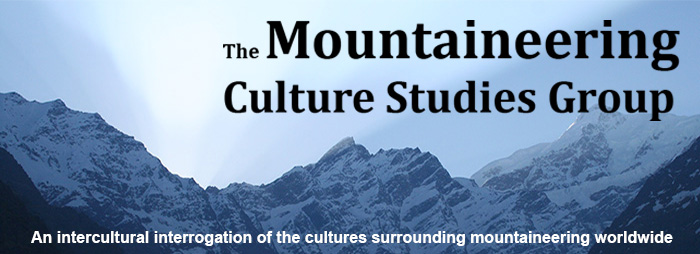
The Mountaineering Culture Studies Group is made possible through the Rackham Interdisciplinary Workshop programme at the Rackham Graduate School, University of Michigan. It is also generously supported as a Special Interest Group by the university's Department of English.
The Mountaineering Culture Studies Group brings together scholars from different parts of the academy—and the world—to discuss and present work surrounding the literatures and cultures of mountaineering worldwide. The textual and, more recently, cinematographic traditions around mountaineering uniquely unite some of the most influential intellectual strands of our time: post-colonialist thought, eco-critical and conservationalist approaches to literature, discourses of travel and exploration, social and ecological changes resulting from commerce and tourism, use of language to express severe physical experience, transnational ethnographies and anthropologies, and oropolitical testimonies.
Since the beginnings in the mid-nineteenth century, the forms and stakes of representations surrounding mountaineering have multiplied. What we now have is a body of material of remarkable diversity and inter-disciplinary potential. Frank Smythe’s assemblages of photographs with text to inaugurate the picture travel book, Eric Shipton’s nostalgic yet grittily detailed expedition reports, Sherry Ortner and Stanley Stevens’s anthropological and ethnographical work on culturally and environmentally endangered geographies, Uma Prasad Mukherjee’s lyrical travel narratives in Bengali, Harish Kapadia’s deeply invested conservation writings and travel guides, Peter Hopkirk’s thrilling tale of a century of espionage and infiltration around Tibet and the roof of the world, Nicholas Roerich’s richly mesmerised and mesmerising paintings, and Maria Coffey’s introspective use of writing as a means of coming to terms with profound loss, number only some of the works that define this field.
The second half of the twentieth century onwards, mountaineering has increasingly constituted a global undertaking: teams composed of climbers from different countries have crossed international borders to access new routes for scaling geological formations across the world. Long before globalization became a topical issue, mountaineering—and the literature it spawned—served as a microcosm in which to explore the opportunities of transnational endeavour. This has not occurred without suspicion and tension: witness the recent incident—in the summer of 2013—at Camp 2 of Everest in which a few dozen Sherpas, and European climbers Ueli Steck, Simone Moro, and Jonathan Griffith, came into unprecedented and furious combat with each other. Yet, the principle, namely that people from around the world should enjoy equal access to high rock and snow and ice formations, remains a compelling example of how to think differently about both enterprise and the environment.
The MCSG meets every month to focus critical attention on works in progress by members, and slide-shows/presentations/lectures by other scholars and practitioners leading the field. Published work in various forms—books, journals, ephemera, films, photographs, climbing manuals, transcriptions of audio-footage from climbers, Web sites and blogs—are used to structure discussion. It also actively welcomes scholars whose pioneering works have in many ways established the scope of this wide field. The workshop will aim to make a lasting contribution to the academic—and wider—community by foregrounding a set of texts and concerns that probes and enlarges the range of methodological and critical scholarly tools brought to bear on the study of mountaineering culture across disciplines.



